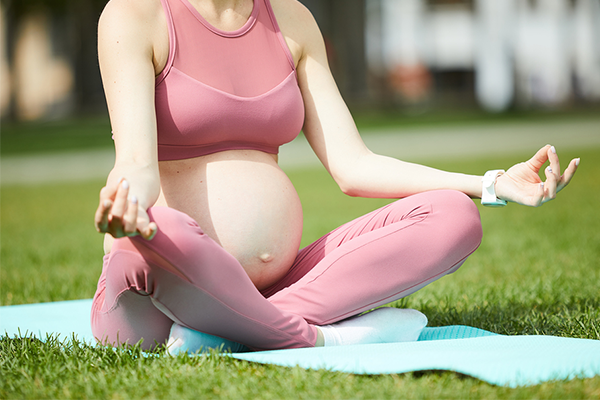In a scene in the film Sex and the City, Carrie asks Charlotte why she has stopped running since she became pregnant. “Because I’m afraid something bad is going to happen,” she says, near tears.
Many women who are pregnant feel the same way. Chalk it up to years of people telling pregnant women to “take it easy,” or the very real fear of miscarriage during the first trimester.
Experts agree though: Exercise is actually very safe during pregnancy. It’s even encouraged: If you think about it, you want strong muscles—those are what help get you through potentially hours of the exhausting cardiovascular activity otherwise known as childbirth.
“Women who are pregnant can be very scared to do anything,” said Dr. Jennifer Lanzer, an OB/GYN at Augusta University Health—who at press time was about to give birth to her first child. “Always talk to your doctor about it first, but the vast majority of women are totally safe to continue on with the level of activity they had prior to pregnancy. And even women who were sedentary can start with low-impact activity.”
Here’s the Worry
The first step is always to check with your doctor about starting or continuing any exercise, especially if you’re pregnant.
Exercise isn’t a good idea for any pregnant woman who has:
- High blood pressure
- Vaginal bleeding
- Ruptured membranes (also known as “your water breaking”)
- • Any other preterm labor symptoms
If you have been exercising and experience any of these conditions, call your doctor or go to the hospital right away.
Why Exercise?
Along with ensuring you’re strong enough to cope with many hours of labor, exercise has been shown to decrease complications during pregnancy and birth. It can also lower your risk for gestational diabetes. “Exercise in pregnancy just tends to lead to better outcomes,” said Lanzer.
“At least, that’s why I tell myself every day to get up and moving,” she added with a laugh. “It certainly is a lot harder when you’re pregnant. But always ask your doctor questions, drink plenty of water to stay hydrated, and set the brakes when you need to.”
Still Exercising
If you’re like Charlotte and have been a runner or have regularly participated in another activity or sport, in most cases, you’re safe to keep on with your same level of activity. At least, to a point: “Eventually, your baby starts growing larger and your center of gravity shifts. So pay attention to your body, and make good accommodations for that,” said Lanzer.
Some special situations also call for some extra care:
- Doctors don’t recommend that women continue with contact sports or anything with a high risk of falling, including horseback riding.
- If you’ve been doing crossfit, it’s fine if you want to keep on, but swap out the box jump for another activity where you don’t have the fall risk.
- If you’re a scuba diver, hold off until after you’ve had the baby: Those rapid changes in pressure aren’t recommended.
- Hot yoga or any activity that might cause you to overheat may increase your risk of passing out, so again, hold off. “That’s why we don’t recommend using saunas during pregnancy,” said Lanzer. “Those elevated temperatures can also carry a risk for baby.”
- Traditional crunches to make your abs flat “aren’t going to work at this point anyway,” said Lanzer with a laugh. Plus, laying on your back for anything more than just a few minutes can put pressure on major blood vessels, decreasing blood flow to the brain and causing you to feel dizzy or lightheaded. Instead, to help keep your abdominals strong, do work on all fours, or try standing and twisting work to strengthen oblique muscles.
- • Most yoga sessions end with shavasana, several minutes where you lay on your back and relax. Instead, curl up on your side.
Also, make sure your instructor or trainer—if you have one—knows that you are pregnant. “And it’s not just, ‘Hey, I’m pregnant—let me know if there’s anything I should do,’” said Lanzer. “Constantly communicate with them to let them know how it’s going and how you’re feeling so they can understand what’s going on and make recommendations.”
Starting Exercise
If you didn’t exercise regularly before you were pregnant, the best advice is to start out slow. “Walking is one of the best exercises, and it’s very safe in pregnancy,” said Lanzer. “That’s a really good place to start, along with some light strength training.”
As your physical fitness improves, you can work up to the recommended 20 to 30 minutes of getting your heart rate up most days of the week. “Make sure you’re never exceeding the threshold,” said Lanzer. “A good way to measure that is if you can still carry on a conversation while you’re exercising.”
Always—Always!—Listen to Your Body
As you get into your second and third trimester, you may find that you get more short of breath during exercise. Or the exercise you’ve always done doesn’t feel right anymore. Pay attention to that, because it’s OK to dial it back, said Lanzer.
“Even if you’re used to being very physically active, you have to accept that your body is changing,” she said.
Then, after you have your baby, give yourself at least six weeks to recover before you start exercising again.
“Pregnancy is a great time to be motivated to be healthy,” said Lanzer. “Really, for a lot of women, it’s a wake-up call to take care of myself and this baby I’m carrying. Women want to be that healthy mom who can run around and chase their child after delivery. So it’s a wonderful time to focus on being healthy and becoming healthier.”





